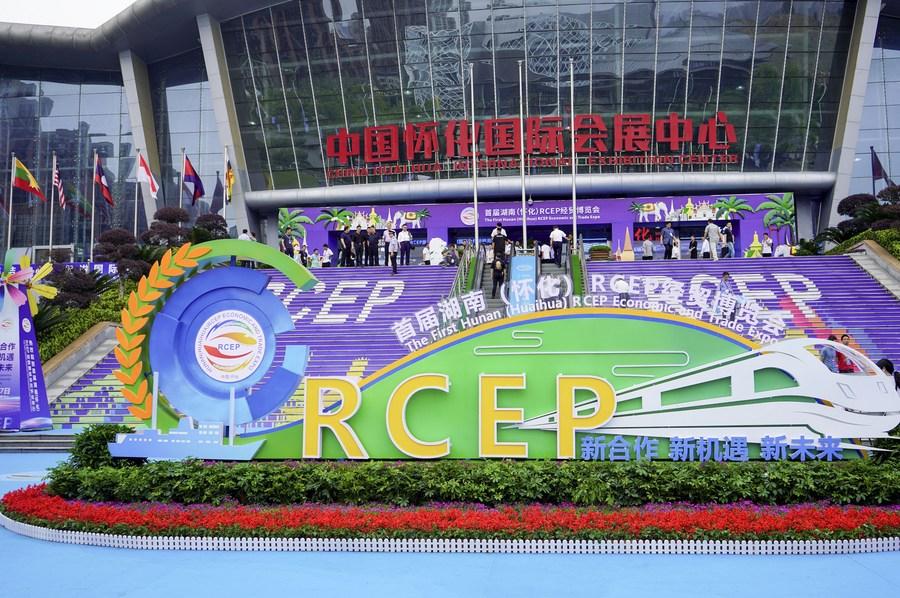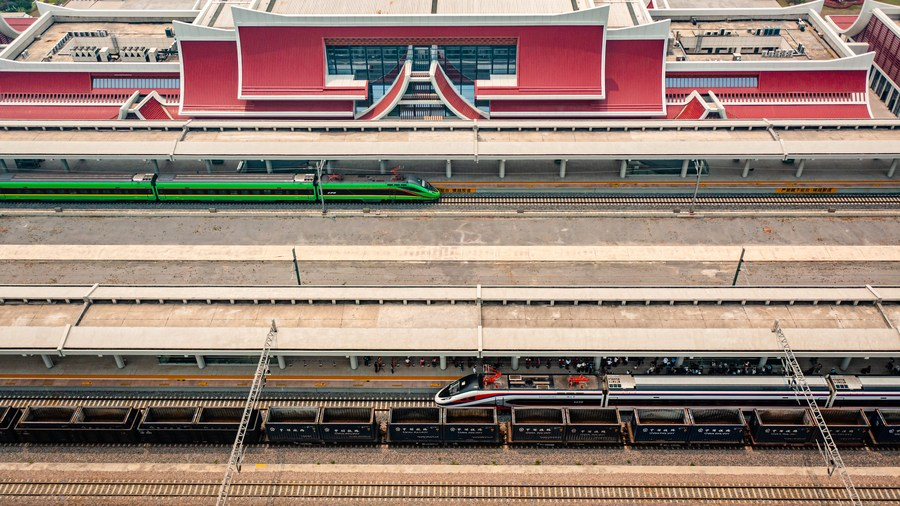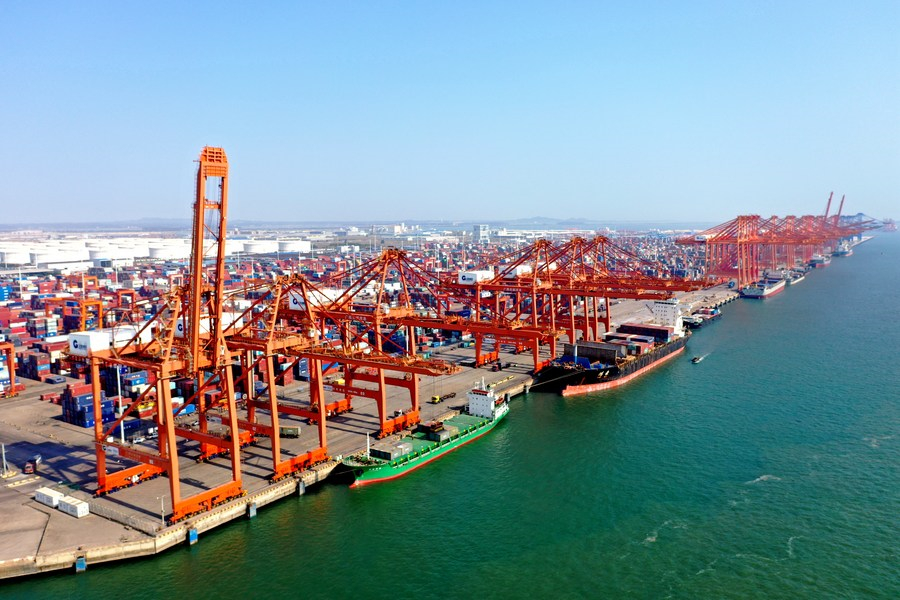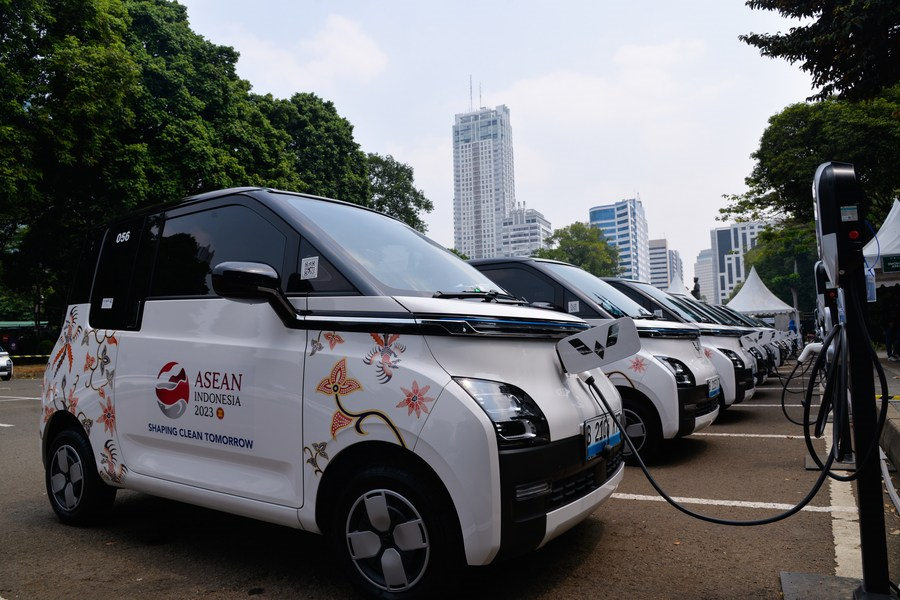China, ASEAN join forces to build an ever closer community with shared future
* Amid rising geopolitical tensions and sluggish economic recovery, China and the Association of Southeast Asian Nations (ASEAN) have pledged closer ties to counter global challenges, injecting certainty and new momentum into regional growth and stability.
* During the 26th China-ASEAN Summit, ASEAN countries said they will strengthen the synergy of the BRI, and strengthen cooperation in areas including agriculture, trade, investment, digital economy, technology, education and culture.
JAKARTA -- Amid rising geopolitical tensions and sluggish economic recovery, China and the Association of Southeast Asian Nations (ASEAN) have pledged closer ties to counter global challenges, injecting certainty and new momentum into regional growth and stability.

This photo taken on May 5, 2023 shows the venue for the First Hunan (Huaihua) RCEP Economic and Trade Expo in Huaihua City, central China's Hunan Province. [Xinhua/Yu Chunsheng]
China and ASEAN should work together to build an economic growth center, enhance interconnectivity, and strengthen cooperation in industrial and supply chains for a closer China-ASEAN community with a shared future, Chinese Premier Li Qiang said while addressing the 26th China-ASEAN Summit held in Indonesia's capital Jakarta on Wednesday.
Since the inception of a dialogue relationship in the early 1990s, China and ASEAN have forged ahead together with comprehensive cooperation and brought tangible benefits to people in the region.
With growing connectivity, deepening economic integration, and greater opportunities for future cooperation, China and ASEAN are committed to building a common home of peace, tranquility, prosperity, beauty and friendship.
ENHANCED INTERCONNECTIVITY
About 13 km away from the Jakarta Convention Center, where leaders from various countries are gathering at the 43rd ASEAN Summit to discuss collaborative opportunities, sits a flagship project under the Belt and Road Initiative (BRI) between China and Indonesia.
The Jakarta-Bandung High-Speed Railway (HSR) is the first overseas high-speed railway project that fully uses Chinese railway systems, technology, and industrial components, and will be the first high-speed railway in Indonesia and Southeast Asia.
The HSR and future transit-oriented development will bring new economic growth and job opportunities to West Java and its people, said Ridwan Kamil, governor of the Indonesian province located in the west of Java island.
The HSR is a typical example of win-win cooperation under the BRI. Over the past decade, the initiative has yielded fruitful outcomes, including plentiful landmark cooperation projects between China and ASEAN.

This aerial photo taken on April 13, 2023 shows the Fuxing (top) and Lane Xang electric multiple unit (EMU) trains at the Mohan railway station of the China-Laos Railway in southwest China's Yunnan Province. [Xinhua/Hu Chao]
Many iconic projects under the BRI have been completed as scheduled and with high quality, such as the China-Laos Railway and Cambodia's Phnom Penh-Sihanoukville Expressway. These projects have not only connected the key nodes of regional infrastructure, but more importantly, they also have had a demonstration effect, providing a strong impetus to further enhance regional connectivity, Chinese Ambassador to ASEAN Hou Yanqi said.
During the 26th China-ASEAN Summit, ASEAN countries said they will strengthen the synergy of the BRI, and strengthen cooperation in areas including agriculture, trade, investment, digital economy, technology, education and culture.
COMMON DEVELOPMENT
As reflected by the theme of the 43rd ASEAN summit, "ASEAN Matters: Epicentrum of Growth," Indonesia, the current ASEAN chair, expressed the hope that the association will focus on efforts to make ASEAN a fast-growing, inclusive, and sustainable economic region in the long term.
As China and ASEAN remain each other's top trading partner, their closer ties are important to ensure sustainable development and prosperity in the region.
"We need to make this (China-ASEAN) cooperation meaningful by realizing concrete and mutually advantageous cooperation," Indonesian President Joko Widodo said at the 26th China-ASEAN Summit.
During the summit, a joint statement was issued on mutually beneficial cooperation between the BRI and the ASEAN Outlook on the Indo-Pacific.
A series of outcome documents were also adopted in such fields as science and technology, agriculture and e-commerce.
"Despite facing various challenges, including protectionism, geopolitical competition, and economic downturns, China and ASEAN have managed to maintain a robust and positive relationship," said Thong Mengdavid, a research supervisor at the Phnom Penh-based independent think tank the Asian Vision Institute.

This aerial photo taken on Feb. 23, 2023 shows the Qinzhou Port in south China's Guangxi Zhuang Autonomous Region. [Xinhua]
In 2022, bilateral trade increased 11.2 percent year-on-year to 975.3 billion U.S. dollars, up significantly from 443.6 billion dollars a decade ago. By July this year, two-way investments topped 380 billion dollars, with an increasing number of Chinese-funded companies and jointly-developed innovation parks.
In a further step towards common development, China and ASEAN have signed and implemented the Regional Comprehensive Economic Partnership (RCEP), the world's largest free trade pact that became fully active on June 2 for all its 15 members.
The RCEP has provided a valuable opportunity to all its members to access the huge Chinese market with preferential tariffs, said Joseph Matthews, a senior professor at the BELTEI International University in Phnom Penh.
"China is committed to further enhancing trade partnership with ASEAN," Matthews said.
BROADER PROSPECTS
Inside the Jakarta Convention Center are a wide array of mini-electric cars manufactured by Chinese carmaker Wuling in Indonesia, which are providing commuter service for delegations to the 43rd ASEAN summit.
China is now the world's largest exporter of electric vehicles (EV), and major Chinese EV brands are setting up assembly plants across Southeast Asia, said Koh King Kee, president of the Malaysian think tank the Center for New Inclusive Asia.

This photo taken on Sept. 6, 2023 shows Wuling Air electric vehicles for the 43rd Association of Southeast Asian Nations (ASEAN) Summit in Jakarta, Indonesia. [Xinhua/Xu Qin]
As a world leader in green development, China will have a big role to play in ASEAN countries' transition to clean energy, Koh said.
Green development is among the growing number of fields where China and ASEAN see huge collaboration potential and closer ties.
Another cooperation highlight is the digital economy, the development of which ASEAN countries vowed to speed up during the 43rd ASEAN summit.
"Digital economy in ASEAN in 2030 is expected to grow to 1 trillion U.S. dollars. And the adoption of digital innovation needs to be strengthened to support the creative economy and small and medium-sized enterprises," Widodo said at one of the sideline events of the ASEAN summit.
"China, which is the world's second-largest digital economy and ranks first in terms of online retail trade, is ASEAN's perfect partner in digital economy development," Koh said.
On broader prospects for cooperation, ASEAN countries are expected to expedite an updated version of the China-ASEAN Free Trade Area (FTA) in line with the agreed timeline.
China has proposed to accelerate ASEAN-China FTA 3.0 Upgrade Negotiations and strive to conclude negotiations in 2024, according to a list of China's cooperation initiatives for the ASEAN-related summits.
The negotiations on the updated version of the FTA cover fields such as trade in goods, investment, the digital and green economy, all of which hold significant trade and growth opportunities that will contribute to ASEAN countries' post-pandemic economic growth and their long-term sustainability goals, said Marthe Hinojales, senior economist at the ASEAN+3 Macroeconomic Research Office.
"Looking into the future, the economic and trade ties between China and ASEAN will further deepen," said Bambang Suryono, president of the Jakarta-based think tank Nanyang ASEAN Foundation.
Video reporters: Sun Lei, Li Guangzheng, Gulu, Wayang; Video editors: Zhang Nan, Luo Hui, Zheng Xin, Liu Yutian
























